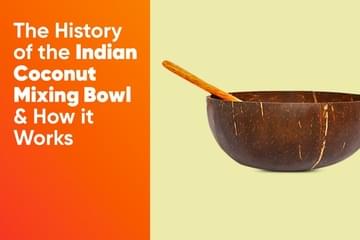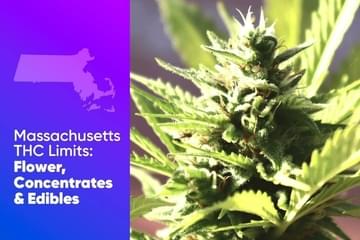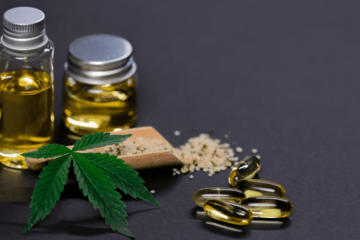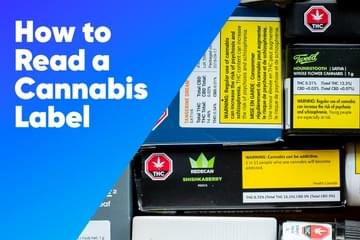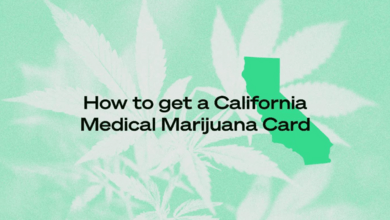
How to Get a California Medical Marijuana Card in 2022
Published on 5/19/22
Are you interested in getting a Medical Marijuana Card in California? You've come to the right place. We hope this article acts as a valuable guide to help you understand the process of applying for your MMJ Card. We keep this information up to date to ensure it is accurate and makes your journey as simple as possible. Keep reading to find out more.
Table of contents
- Getting a California Medical Marijuana Card Online
- Who Can Apply?
- What does an MMJ Card Permit in California?
- How do I Apply?
- What does my Online Medical Marijuana Evaluation with Leafwell Include?
- How Much Does a Medical Marijuana Card Cost in California?
- What Conditions Qualify for Medical Marijuana Cards in California?
- What Documents Do I Need to Apply for a Medical Cannabis Card?
- Do I Need to Present my Medical Records to Leafwell?
- How does a Caregiver Apply for a Medical Marijuana Card?
- Can a Qualifying Patient Grow Cannabis in California?
- Are my Details Kept Confidential When I Apply for a Medical Marijuana Card?
- Does California Have Medical Marijuana Reciprocity?
- Getting a Medical Marijuana Card in San Francisco, Bakersfield, Fresno, San Diego, and Los Angeles
- History of Medical Marijuana in California
- California Medical Marijuana Laws
- Useful Links
Getting a California Medical Marijuana Card Online
2018 is the year cannabis went legal in California. As of 01/01/2018, it is no longer a legal requirement to hold a medical marijuana card for a person aged 21 or over should they possess 1 ounce or less of cannabis (max. 8 g of concentrates). Regardless of the legal recreational market, there are good reasons to get a medical marijuana card. Here's how and why.
Medical cannabis patients in California only pay a 15% tax on their products, and recreational users can pay up to 38% in some municipalities. Plus the amount of cannabis medical marijuana patients can possess and grow is more generous.
Medical cannabis patients also have access to a greater number of products and dispensaries, as not all jurisdictions in California have allowed recreational cannabis dispensaries. Only 161 of California's 482 municipalities have allowed recreational storefronts or establishments to operate.
As a telehealth platform helping people obtain their medical marijuana cards or recommendations, Leafwell has helped our clients quickly and securely get a California Medical Marijuana Card or physician's recommendation online. Note, applying for a physical ID card is an optional extra; you only need a qualifying physician's recommendation to purchase medical marijuana legally.
We've put together this valuable guide to answer all your questions and help individuals living in California understand the importance of applying for their California MMJ Card via the easy, HIPAA-compliant process offered by Leafwell's telemedicine platform. You can visit our Ultimate Guide to Getting a Medical Marijuana Card for more general information.
Who Can Apply?
To apply for a Medical Marijuana Card or recommendation in California, you must be a legal resident of California.
Patients must be aged 18 or over in order to apply for a medical marijuana card for themselves, and minors can have caregivers apply on their behalf.
Caregivers must also be 18. Primary caregivers can apply if:
- The person you care for is legally entitled to use medical marijuana
- You meet the legal definition of a primary caregiver under the CUA: "primary caregiver" means the individual designated by the person exempted under this section who has consistently assumed responsibility for the housing, health, or safety of that person."
Primary caregivers may possess and/or cultivate an amount of marijuana reasonably related to the patient's current medical needs. A caregiver may apply for a Medical Marijuana ID Card (MMIC), but you do not need to do this, just as patients don't need a card.
The state has a private, doctor-run registry that allows you to visit medical marijuana dispensaries in California and puts you under the protection of the state's medical marijuana laws.
What Does an MMJ Card Permit in California?
Patients can carry up to 8oz of flower or concentrate. Recreational users can only have up to 1oz of flower and 8oz of concentrate.
Do not take your cannabis over state lines. Keep your cannabis in California. If you are moving around the state of California with cannabis, keep it to reasonable amounts (e.g., 1 ounce/28.5 grams or less of dried flower or 8 g of hashish/concentrate, as per recreational laws), and preferably locked away and safely kept.
If you are carrying both concentrate and flower, you cannot go over the equivalent possession amounts. This means you cannot carry both an ounce of dried cannabis flower and 8 oz of concentrate at the same time. This applies to recreational cannabis users, and medical patients may have some leeway, but we don't recommend tempting fate wherever possible.
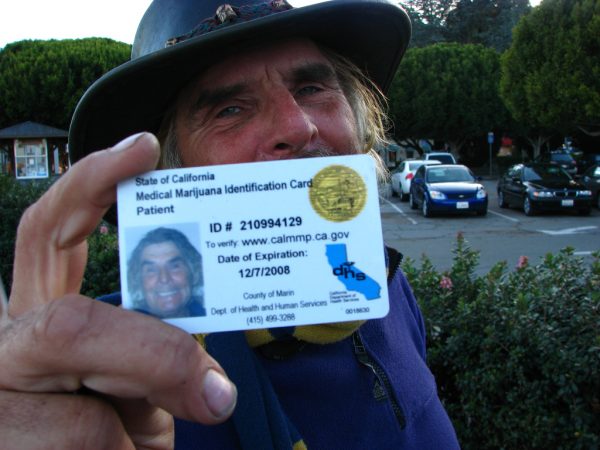
How Do I Apply?
With Leafwell, you can get your California Medical Marijuana Card in five simple steps or sign up to the registry in just three simple steps:
1. Register online with Leafwell
You can speak to a doctor and qualify for a California medical marijuana card online. The cost of the online consultation is $49 for a CA physician's medicinal cannabis recommendation letter. For $59, we'll also send you a plastic ID card. You are only billed if approved.
2. Attend your appointment and discuss with your physician why you would like an MMJ Card
The doctor will ask you questions based on your medical history and provide you with advice and guidance on whether medical marijuana is a good choice for you.
3. Receive your certificate from Leafwell
This certificate contains a unique patient ID number which puts you on a private, doctor-run registry that allows you to visit medical marijuana dispensaries in California and puts you under the protection of the state's medical marijuana laws. This certificate will be emailed to you immediately after your successful appointment. We'll also send you a hard copy in the mail shortly afterwards but you only need the PDF version to purchase cannabis.
4. Apply for a card on the government website (optional)
Note that you don't need an MMJ card in California. The ID number you receive from your certificate is enough as it acts as a qualifying physician's recommendation. However, you can also apply for a county-issues medical marijuana identification card if you wish - this is voluntary.
5. Receive your medical marijuana card (optional)
If you choose to order a card (the $59 package), you will receive your medical marijuana card in the mail. Your certificate will be valid for one year from the date of issue.
What does my Online Medical Marijuana Evaluation with Leafwell Include?
Your online medical marijuana evaluation with Leafwell is quick and easy. In order to get started, we'll need you to provide us with some preliminary details and give you the option of uploading some medical records. These are all passed securely to one of our registered practitioners, who can familiarize themselves with your application before your consultation.
The consultation itself is secure and straightforward, taking place on our bespoke telemedicine platform. You will meet with a California registered practitioner who has experience issuing certificates for medical marijuana to patients for a range of medical issues. The registered practitioner will speak with you about why you are applying and ask some questions about your medical conditions and history.
At the end of the consultation, the registered practitioner will be able to make an informed decision about whether they recommend the use of medical cannabis based on the medical information they have obtained. If an application is successful, the registered practitioner will complete the certification, promptly emailed in PDF form. This certificate will have your unique ID number, which will allow you to sign up for the state's private registry. You can also use the certificate and number to apply for a Medical Marijuana ID card.
If an application is unsuccessful, you will receive an email detailing why our registered practitioner felt unable to provide you with the certificate. You will not be charged for the consultation.
Once obtained, the certification will last for one year.
How Much Does a Medical Marijuana Card Cost in California?
The initial consultation with one of the California registered practitioners via Leafwell's HIPAA compliant online consultation service is a flat fee of $49 for a rec letter. However, if you do not qualify for an MMJ Card and our practitioner elects not to sign your certificate, you will not be charged. If you want the plastic ID card, the consultant must apply for an MMJ Card. However, if you do choose to, you'll need to check the fees in your county because they differ across the state. They are capped at $100 but do vary. Both the card and the recommendation certificate from Leafwell are valid for one year. Every time you renew, you will be required to meet with a state-licensed physician via a telemedicine platform like Leafwell.
There is no additional fee for applications that include a designated caregiver. However, a consultation for a minor costs $99.
Insurance does not currently cover the cost of applying for an MMJ Card in California because cannabis is illegal at the federal level.
What Conditions Qualify for Medical Marijuana Cards in California?
According to California law in 2021, the following debilitating conditions may qualify you for a medical marijuana card in California:
- AIDS
- Anorexia
- Arthritis
- Cachexia (Wasting Syndrome)
- Cancer
- Chronic Pain
- Glaucoma
- Migraine
- Persistent muscle spasms (including spasms associated with multiple sclerosis)
- Seizures (including epileptic seizures)
- Severe nausea
- Any other chronic or persistent medical symptom affects someone's ability to conduct significant life activities.
Note that this list is up to date as of July 2021. Legislation or the Commissioner of Health may add additional conditions, at which time, Leafwell will update this list.
What Documents Do I Need to Apply for a Medical Cannabis Card?
You do not need to carry an ID card that certifies you as a medical cannabis user. However, you can apply if you wish to do so.
To apply for your MMJ Card in California, you will need to show your signed certificate, which provides proof of your condition and your identification documents. You should gather together the following:
- ID
- A signed certificate (which can be obtained via Leafwell)
Below are all of the acceptable forms these documents may take.
Acceptable ID
- Valid, unexpired Driver's License
- State-produced Identification Card
- Passport
Minors can apply using their Birth Certificate or Passport
Signed Certification
A PDF version will be emailed to you upon successful completion of your consultation with a registered practitioner on Leafwell's secure platform and this includes your unique patient ID.
Do I Need to Present my Medical Records to Leafwell?
No, this is not a requirement. However, we recommend you provide them if you have them because this allows our healthcare providers to give an accurate assessment to ensure that medical cannabis is a good option for each patient on a case-by-case basis.
How Does a Caregiver Apply for a Medical Marijuana Card?
Some patients may be eligible for an MMJ Card but cannot apply for one themselves. For example, should the patient be a minor under the age of 18, or if the patient needs assistance accessing medical cannabis, a caregiver can be assigned to complete the process on their behalf.
To qualify as a primary caregiver under California marijuana law, you need to meet the following criteria:
- You have been designated for that purpose by a legal, medical marijuana user
- You are consistently responsible for that person's housing, health, and/or safety
- The care you provide is independent of the assistance you give the person in taking medical marijuana
- You began taking care of the person at or before the time you assumed responsibility for assisting with medical marijuana.
Can a Qualifying Patient Grow Cannabis in California?
Yes, you can cultivate cannabis at home. You can grow up to six plants at any one time. You can only grow plants at home and this must be in a lockable space which is not visible from off the property. Some cities also prohibit outdoor growing.
Are my Details Kept Confidential When I Apply for a Medical Marijuana Card?
Yes. Leafwell is committed to protecting the privacy of our patients. Our online service is HIPAA compliant, and our systems are designed to keep all of your confidential details safe.
Does California Have Medical Marijuana Reciprocity?
Yes. Arizona, Hawaii, Maine, Nevada, New Hampshire, Rhode Island, and Michigan recognize a valid, in-date medical marijuana identification card and recommendation letter from California. However, entrance into another state's medical cannabis dispensaries is at the dispensary's discretion. Reciprocity means that participating states recognize California medical marijuana cards and recommendations as valid. Whether California recognizes medical marijuana cards from other states is still yet to be decided, but it looks as if the answer is "no" so far.
This reciprocity is one key benefit for medical marijuana users. Unlike recreational cannabis users, medical marijuana users with a medical marijuana card can travel to the states listed above and purchase the medical marijuana they require while they are out of state.
Getting a Medical Marijuana Card in San Francisco, Bakersfield, Fresno, San Diego, and Los Angeles
Although state laws generally apply statewide, there are slight differences between different locales. Some cities are more tolerant than others, and some prefer non-medical cannabis dispensaries out of town entirely!
San Francisco is generally quite tolerant of cannabis, but this doesn't mean there aren't any rules. San Francisco is one of the few places in California (and in the country) where public use of cannabis onsite in cannabis lounges is allowed. As far as using cannabis outside goes, avoid using cannabis in public parks or near schools. Keep it away from children and busy public areas (some of which have restricted cannabis smoking), and you should be OK.
Bakersfield in California is perhaps one of the less cannabis-friendly, and Kern County & Bakersfield have only recently started to open up for recreational sales. Medical cannabis dispensaries are around, but there are fewer recreational facilities.
Fresno is another area in California that didn't take to cannabis, and it is only recently that dispensaries were accepted and allowed to run under Prop. 215 rules. Medical dispensaries take precedence in Fresno, and even then, medical marijuana is not always warmly greeted. However, having a medical marijuana identification card (MMIC) in Fresno may prove to be particularly useful.
San Diego is generally cannabis-friendly, and has embraced cannabis legalization. San Diego County chose to ban any new medical marijuana collectives in the city that weren't approved before April 14, 2017, which sparked a lawsuit as many dispensaries spent millions updating their businesses. There is some restriction on growing cannabis, with only indoor grow allowed.
Los Angeles City allows for medical and recreational dispensaries, but LA County only allowed for medical and recreational sales more recently as they developed a legal framework.
Regardless of where you are in California, you can get a medical marijuana card online with Leafwell.
History of Medical Marijuana in California
Here is a brief overview of the history of medical marijuana in California:
- 1972 - California became the first state to vote on a ballot that argued for the legalization of cannabis. Proposition 19 would have legalized use, possession and cultivation of cannabis (but not commercial sales). It lost 33 percent to 67 percent but set California up as a state which would lead the way.
- 1996 - Medical marijuana law comes into effect - Proposition 215 refers to the Compassionate Use Act of 1996, and is still in effect today. According to state law, this passage exempts patients and defines caregivers who possess or cultivate cannabis for medical treatment and who have a physician's recommendation from punishment. This was the first state to legalize medical cannabis
- 2003 - Senate Bill 420 clarified much of the language in the initial bill and established the current identification card system for medical cannabis patients.
- 2016 - Proposition 64, the Adult Use of Marijuana Act, legalized the recreational use of cannabis. It passed with 57 percent of the vote
- 2019 - amendments were passed to the Senate Bill 34, which allowed licensed retailers and dispensaries to provide medical cannabis for free to qualified patients who were for some reason unable to access the product.
- 2020 - Governor Newsom issued an executive order which extended the validity of MMICs in the face of Covid-19 and a lack of access to some facilities
California Medical Marijuana Laws
As a medical marijuana cardholder or user with an ID number and on the registry, knowing what your card/ID number permits is essential. While recreational and medical cannabis are both legal in California, you need to be aware of several laws.
If you are carrying both concentrate and flower, you cannot go over the equivalent possession amounts. This means you cannot have both an ounce of dried cannabis flower and 8 g of concentrate at the same time. If you carry 4 g of concentrate, the maximum amount of flower you can legally carry is 14.25 g of dried cannabis flower. This applies to recreational cannabis users, and medical patients may have some leeway, but we don't recommend tempting fate wherever possible.
Some restrictions apply to both recreational and medical marijuana users alike. They include:
- No smoking cannabis where smoking tobacco is not permitted.
- No smoking of cannabis in public, unless allowed by public ordinance - doing so could land you a fine, especially if you are near a government building, public park, main street, or anywhere where there might be large congregations of children.
- Using cannabis while driving is illegal. You cannot legally drive when under the influence of cannabis, and any cannabis kept in the car with you must be kept locked away and out of sight. Passengers in the vehicle are not legally allowed to consume cannabis while in a vehicle.
- You cannot ingest cannabis within 1,000 feet of a school, daycare center, or youth center unless you are in a private residence and any cannabis smell or smoke is not detectable by children.
- Any cannabis must be kept out of reach of children. Treat it as you would any other medication, and lock it away.
- Your second amendment right to bear arms is also affected.
Remember, while recreational cannabis use is legal in California, we recommend you register as a medical marijuana patient if possible. It could be argued that those with a valid medical marijuana card have a lot more legal precedent protecting them. A more significant number of laws could be seen to protect patients compared to those who use cannabis recreationally. Access is also improved for cardholders, and you are able to buy better quality products. Additionally, as there are reciprocity laws in place, you're able to travel to other states and purchase medical cannabis legally there too.









